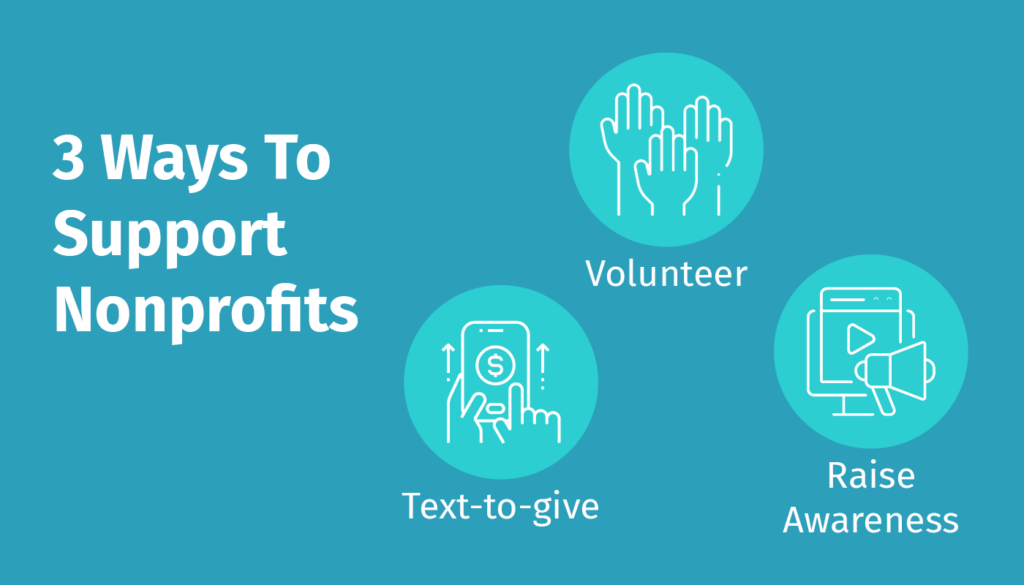As a church leader, you know the importance of community and serving others. In the same way that your congregation gathers to fulfill your church’s mission, other nonprofit organizations depend on a community of donors and volunteers to better society. In fact, the very donors who are stewarded by nonprofits may be members of your church!
By supporting a nonprofit organization, your church can make a greater impact on members and in the community. In this guide, we’ll explore three reasons you should support another nonprofit cause. Let’s begin!
1. Nonprofit support sets an example to members of your church.
When choosing a children’s curriculum or planning a sermon series, your church likely aims to align with biblical principles. Nonprofit support gives your church opportunities to act on the lessons you teach about service, giving a practical example of what biblical teachings look like in practice.
Through nonprofit support, your church can demonstrate:
- Servitude: Servitude is a core element of the Christian faith, and what better way to put service into action than by getting out in the community? Nonprofit missions are centered around serving the community in some way, so your church’s involvement will set a positive example of what it means to serve others.
- Generosity: By giving freely, your church demonstrates the importance of caring for others above oneself. Whether congregants give large gifts for a nonprofit cause or sacrifice free time on the weekend to volunteer, they’ll have the opportunity to put others’ needs ahead of their own. And what makes it even better is doing it together as a church body.
- Good stewardship: With finances, time, and abilities, Christians are called to be good stewards of the resources God gives them. Donating funds, time, and skills to a nonprofit cause demonstrates good stewardship of the church’s resources to make a difference in the community and the lives of others.
You can reinforce the value of congregants’ support by showing your gratitude for their involvement. For example, you might show volunteer appreciation by giving a thank-you gift to members of your church who volunteer. This shows that your church values volunteers’ support and encourages them to continue volunteering.
2. Your church can minister to others by supporting a nonprofit.
Whether your church hosts its own fundraising event, participates in Giving Tuesday, or volunteers around the community, your efforts will inevitably introduce you to new people. This valuable time gives you space to build relationships with people you may have never met otherwise. Nonprofit support offers awesome opportunities to meet new people and minister to them.
Through nonprofit support, your church could encounter:
- Beneficiaries: A beneficiary is anyone who benefits from the services of a nonprofit. And by supporting a nonprofit, your church is either directly or indirectly impacting the organization’s beneficiaries. For example, people experiencing homelessness might be beneficiaries of the local food bank. Church members might interact with beneficiaries through volunteer roles, during which they can connect with people of all ages, backgrounds, and circumstances. In these situations, volunteers might share children’s curriculum lessons with young kids or their personal testimonies with adults.
- Nonprofit leaders: Depending on the type of support your church provides, you might build close relationships with nonprofit board members, volunteer coordinators, and other leaders. As you get to know them and their passion for nonprofit work, you may identify ways that your two missions overlap. Then, you can build relationships as you encourage and partner with one another!
- Local businesses: According to AlySterling’s corporate philanthropy guide, our purpose-driven economy encourages businesses to consider their social purpose and impact. Many businesses contribute to nonprofits through corporate giving programs, and this can be a great way for your church to connect with local companies.
Think of these interactions as part of your church’s outreach ministry efforts. You may already aim to spread hope in the community, and partnership with a nonprofit is one avenue to do this. These connections can be a platform to connect with those around you and maybe even invite newcomers to your church.
3. Nonprofit support can strengthen relationships among church members.
Your work with nonprofit organizations is not just an opportunity to minister to others, but a way for church members to grow closer together. And cultivating a close-knit congregational culture is key in building the faith community!
Consider the following examples of how nonprofit support could strengthen relationships between members of your church:

- Volunteer: Spending time together is an obvious way to strengthen relationships, but working together toward a common goal can build especially strong connections. When your church encourages members to volunteer together, they’ll learn the spiritual importance of encouraging and uplifting fellow believers.
- Text-to-give: Hosting a mobile giving campaign is an easy way for your church to raise money on behalf of a nonprofit. This opportunity gives space for your church to grow together as they work for a common cause. It’s amazing what can take place when people come together to make a difference!
- Raise awareness: Think about a nonprofit advocate like a sports team fan. When you support a team by wearing their merchandise or talking about the team, you start to feel connected to other fans of the team. In the same way, when members of your church advocate for a nonprofit, they’ll begin to feel connected to the cause and to the other people involved.
Continue building on the importance of relationships as you gather in your church’s life groups, such as in men’s prayer groups or your church’s youth group. Wonder Ink’s guide to choosing children’s curriculum recommends selecting teaching resources that put “loving your neighbor” into practice, which could help set the stage for connecting with other believers through nonprofit support.



